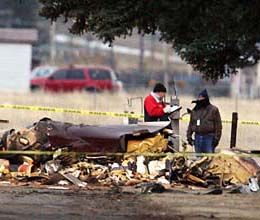By Matt Gouras
The Associated Press
 AP Photo,Mike Albans Officials investigate the scene of the crash. |
BUTTE, Mont. — Investigators said Monday they’ll examine whether the single-engine turboprop plane was overloaded when it nose-dived into a cemetery and killed 14 people on board who were heading to a ski trip.
The plane was likely designed to carry a total of 11 people, including two pilots, Mark Rosenker, acting chairman of the National Transportation Safety Board, said at a news conference. Officials said seven adults and seven children were killed in the crash.
“It will take us a while to understand,” Rosenker said. “We have to get the weights of all the passengers, we have to get the weight of the fuel, all of the luggage.”
Rosenker said he did not know the ages of the children, and it was possible that a very small child would be on the lap of an adult, he said.
“We are going to have to try to understand how and why there were an additional three people (over the assumed configuration) on the aircraft,” Rosenker said. Some luggage was retrievable for weight and measurement analysis, he said.
Also, federal aviation officials said the plane didn’t have a cockpit voice recorder or flight data recorder that investigators use to help determine the cause of an accident and the craft wasn’t certified to carry commercial passengers.
The turboprop plane left Oroville, Calif., headed for Bozeman, Mont., but changed course to Butte, where it crashed on final approach Sunday. The pilot gave no indication to air traffic controllers that the aircraft was experiencing difficulty when the pilot asked to divert to an airport in Butte, Rosenker said in an e-mail earlier in the day.
Rosenker said there was “no indication of any trouble when the diversion was requested to ATC (air traffic control).”
The plane crashed Sunday afternoon just short of the Bert Mooney Airport in Butte. Like thousands of small airports across the country, the Butte airport doesn’t have radar control.
It was the worst plane crash in America since a commuter plane last month fell on a house in a suburb of Buffalo, N.Y., killing all 49 passengers and a man in the home. Before the Buffalo crash there hadn’t been an accident involving a commercial airliner in the U.S. in which there were fatalities in more than two years.
Rosenker confirmed that people aboard the plane were planning to meet others in Bozeman to ski.
A witness said the plane jerked to the left before nose-diving into a cemetery.
Kenny Gulick, 14, told CBS’ “The Early Show” on Monday that he thought he was watching a stunt plane because the pilot was making so many turns.
“He jerked the plane to the left too quickly and lost control of it, but that’s just my guess,” said Gulick. “And all of a sudden it went into a nosedive. I noticed the pilot trying to pull up but he was extremely low to the ground and he didn’t pull up in time.”
On Monday, snow fell gently as investigators gathered before dawn at the scene of the crash in Holy Cross Cemetery, 500 feet short of Bert Mooney Airport.
A California newspaper, the Napa Valley Register, reported on its Web site late Sunday that a family of five from St. Helena, Calif., including three preschoolers, was among the victims.
With no radar at the Butte airport, a pilot approaching would normally switch to a radio frequency used by aircraft coming in and out of Butte to find out if there were any other aircraft in the area. Then the pilot would use visual flight rules and follow the procedures for landing at that airport.
The plane was registered to Eagle Cap Leasing Inc. in Enterprise, Ore., said FAA spokesman Mike Fergus. He didn’t know who was operating the plane.
Eagle Cap’s president is Irving M. Feldkamp of Redlands, Calif., corporate records show. FAA records show that he has been a pilot since 1994 and is certified for instrument flight.
Feldkamp also is listed as president of Glen Helen Raceway in Southern California. There was no response Monday to phone messages left at the raceway seeking comment. A number in Redlands in Feldkamp’s name was disconnected.
The plane was a Pilatus PC-12. In Switzerland, Markus Kaelin, executive assistant to the chairman of Pilatus Aircraft, said the company had no comment.
Steve Guidoni, of Butte, was driving by with his wife when he saw the crash. “It just went straight into the ground. I went over there to try to help. I thought maybe I would pull someone out of the fire.”
Guidoni said he saw luggage and seat cushions lying around, but no bodies. He said the biggest piece of the plane was the size of a kitchen table. “You wouldn’t even know a plane was there,” he said.
Nick Dipasquale, 19, was working at a gas station across the street. “I heard a loud bang,” he said. “It sounded like someone ran into the building.”
The plane took off from Brown Field Municipal airport in San Diego on Saturday evening and flew to Redlands, Calif., about 100 miles north, said Rachel Laing, a spokeswoman for the city of San Diego.
It then left Sunday morning for Vacaville, Calif., according to Flight Aware, a Web-based service that tracks air traffic. From there it flew to Oroville, Calif., and on to Butte.
___
Associated Press writers Tom Verdin in Oroville, Calif.; Mike Blood in Los Angeles and Elliot Spagat in San Diego contributed to this report.











